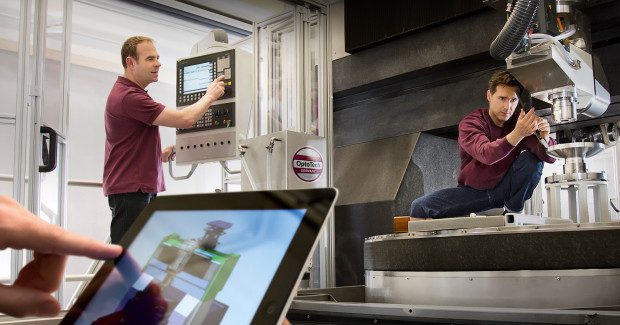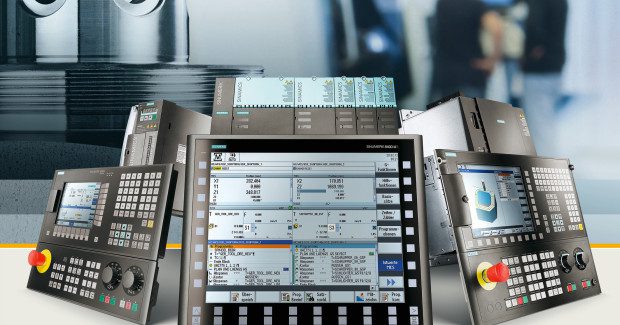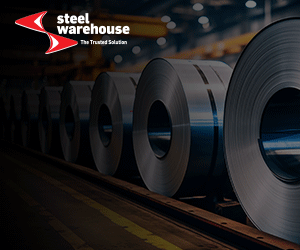Standing on the Edge
The evolving merger of it and manufacturing is pushing shop activities ever closer to the threshold of a new industrial revolution that will reshape the future, not only of the metalworking business, but of all manufacturing as we know it.
Posted: September 20, 2013
During a recent press conference, executives of Siemens focused on three trends that are not only reshaping the way shops do business today, but will eventually merge to change manufacturing as we currently know it and launch the fourth Industrial Revolution.
That’s pretty heady language until you take a moment to reflect on how the anatomy of machine tools has evolved from the first Industrial Revolution that saw the genesis of machines that changed the world by replacing manual production. They were followed, at a relatively slow pace, by the output of electrical drives and motors that framed the second Industrial Revolution. That pace kicked it up a couple of notches with the introduction of computers and the arena of automation that has defined the third Industrial Revolution.
Which brings us back to Siemens executives who believe we are standing on the edge of the fourth Industrial Revolution, a hyper-competitive era where three trends are driving the worlds of IT and industrial controls to become parallel.
First is the need for more integrated solutions in machine tool building, next is the demand to enhance CNC machining productivity, and lastly, the introduction of integrated drive system (IDS) technology for consistent integration across the entire lifecycle of the machine tool.
Earlier this year at Hannover Messe, Siegfried Russwurn, the chief executive offer of the industrial sector and a Siemens AG board member, said, “Never before has the world of manufacturing and production technology been changing as rapidly and fundamentally as today. The increasing penetration of IT and the growing integration of all industrial technologies are taking place in evolutionary steps from today’s perspective . . . the completely IT-based interaction between human being, product, and machine could prove to be a real industrial revolution.”
He’s absolutely correct. Since the emergence of automation, job shops and contract manufacturers of all sizes have been pressured to improve machining time and flexibility. Included in those demands has been a shift towards the integration of front-end product development with shop floor production processes through high-performance software systems.
And according to Rajas Sukthankar, the general manager of Siemens Industry machine tool systems, this front-end/shop integration is going to expand in scale. “In the future,” he says, “production models will demand greater productivity, flexibility and efficiency, while at the same time expecting simplified machine operation and production sequences.”
This “better, faster, stronger” trend has been in place for as long as manufacturing has been around, but in the past it focused almost exclusively on improving the mechanical functionality of machine. Now, the emphasis has shifted to improving electro-mechanical technology and the controls behind it.
Bernd Heuchemer, the vice president of global marketing and communications in the drive technologies division of the Siemens AG motion control systems business , said, “In the CNC environment in particular, and consequently in the field of controls production in general, we have seen heavy involvement for many years already in the area of simulation and the virtual machine, as well as the integration into factory IT systems. The goal is to drive this process of integration forward to ensure that the field of machine tool construction is also prepared to embrace the next step in the industrial revolution.”
So what exactly should shops expect from the next industrial revolution? We’re already seeing it in the continual rapid-paced shift into “smart machining” solutions. The smart functionality of machine tools is improving part accuracy and functional precision in CNC machining. Smart machining is safer for the user and protects capital investments by preventing crashes or other unwanted component collisions. Smart machining leaves less time between changeovers and increases spindle utilization and overall shop efficiency.
Smart functionality is gradually integrating industrial machining processes and maintenance with broader factory IT systems. As these two control worlds become intuitively linked through the digital ties between factory data and machine networks, they are building the bridge of true intelligence that will eventually connect the shop floors of machine tool manufacturers with those of machine tool users. Can anyone say “MTConnect?”
Let’s not forget the human element inside this equation. Although technology is an integral part of manufacturing now and even more so tomorrow, don’t expect things to be quite like a scene from The Jetsons. Human minds will still conceptualize, design and sell the product. Humans, at least for the foreseeable future, will continue to determine the production rules and parameters to meet the demands of the marketplace. The human mind will continue to be the essential driver into this brave new world.
Whether this industrial revolution happens overnight or if it should take 20 years, the linkage of IT to the industrial control worlds promises that we are all going to witness changes in manufacturing that have never been seen before, changes that will redefine the metalworking business forever.

















